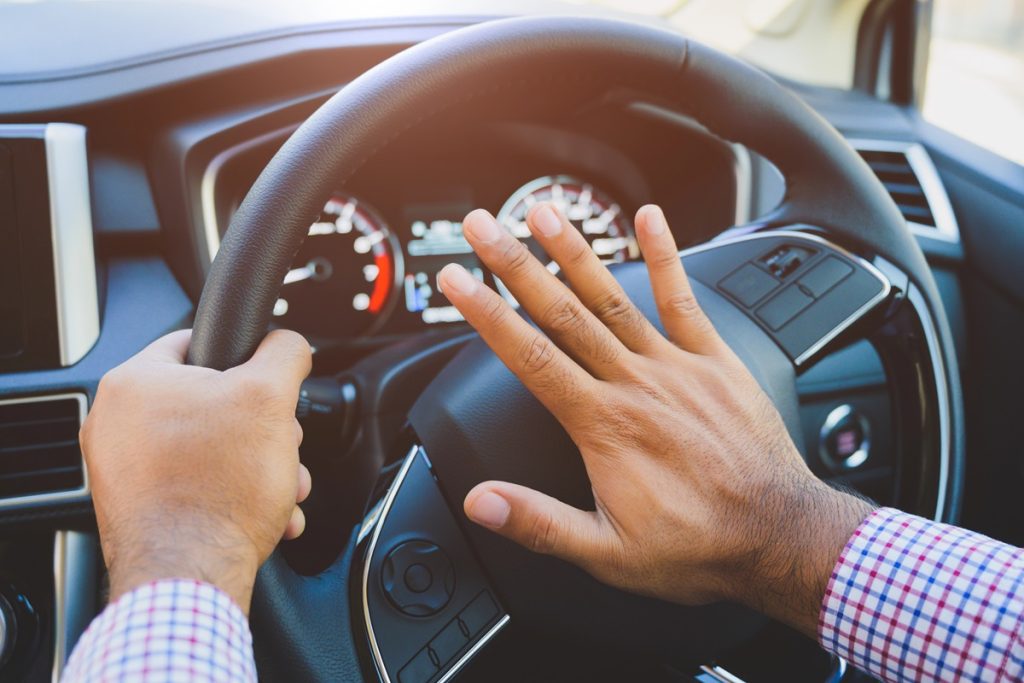Car laws are designed to keep us safe on the road, but many of them can seem bizarre or overly strict. Over time, some laws have become outdated or just plain weird, and most drivers are unaware that they are even breaking them. From quirky regulations about car modifications to unusual rules about how to park, it’s easy to accidentally fall foul of these laws. Despite their odd nature, these rules are enforced and can lead to fines or penalties if you’re not careful. Let’s take a look at 14 car laws that you may have unknowingly violated while driving.
Driving Without Shoes

It’s legal to drive without shoes in most places, but in some states, it’s technically against the law. Though there is no federal law requiring footwear while driving, some local jurisdictions have rules about driving barefoot or in flip-flops. In the case of an accident, not wearing shoes could be considered as contributing to negligent driving.
No Unleashed Dogs in France

In France, it is against the law to drive with an unrestrained dog in the car. The law is meant to reduce distractions while driving and to protect the animal in case of sudden stops or accidents. A fine could be imposed for not properly securing your pet, making it essential to use a pet seatbelt or carrier.
No Honking in Havana, Cuba

In Havana, Cuba, honking your horn is almost entirely prohibited. The rule was put in place to reduce noise pollution in the city, as the constant honking was driving residents crazy. While it might be tempting to honk in traffic, doing so can lead to hefty fines if you’re caught.
No Engine Idling in the UK

In the UK, it’s illegal to leave your car engine running while parked, especially near schools. This regulation aims to reduce pollution and save energy. Although it might seem harmless to keep your engine running in cold weather, violating this law could lead to a fine if you’re caught.
Related: 13 Terrifying Ways Hackers Could Steal Your Car Without Ever Touching It
No Parking Near Fire Hydrants in the US

Parking in front of a fire hydrant is illegal in many places in the United States, and for a good reason. The law ensures that firefighters have easy access to water in emergencies, without having to maneuver around obstructing cars. Ignoring this rule could cost you more than just a ticket, towing is often involved.
Related: 11 Subaru Models Built To Outlast Anything
No Drinking in Your Own Car in Japan

In Japan, it’s illegal to drink alcohol even when parked in your own car. The law stems from the country’s strict stance on drinking and driving. Even if you’re not behind the wheel, consuming alcohol while in the car is still considered a violation of the law.
Related: 15 Jaw-Dropping Monster Trucks That Crush Everything In Their Path
No Hand Gestures in the UAE

In the United Arab Emirates, giving a rude hand gesture while driving can result in a significant fine or even jail time. The law is enforced to maintain civility on the roads and discourage aggressive behavior. It’s a stark reminder to remain calm and composed, even in frustrating traffic situations.
Related: 13 Ways 3D Printing Is Making Cars Faster, Stronger, And Cheaper
No Excessive Tire Squealing in Australia

In some parts of Australia, excessively squealing your tires is illegal, even if you’re not racing. The law is aimed at preventing noise pollution and ensuring that drivers don’t engage in reckless behavior. A fine can be issued if you’re caught spinning your tires unnecessarily in public spaces.
Related: 12 Insane Car Stunts That Defy The Laws Of Physics
No Excessive Car Modifications in Germany

In Germany, certain car modifications are illegal if they alter the original factory design in any significant way. This includes changes to exhaust systems, bodywork, or engine performance that could increase noise or emissions. These laws are designed to protect the environment and maintain safety standards.
Related: 12 Most Iconic Mercedes Benz Convertibles Ever Built
No Hitchhiking in the UK

Hitchhiking is illegal in certain areas of the UK, especially on highways and motorways. The law is in place to maintain safety, as it’s considered dangerous for both the hitchhiker and the driver. While you might see people attempting to hitch a ride, doing so on certain roads could land you a fine.
Related: 12 Reasons AI-Powered Co-Pilots Might Be The Future
No Parking for More Than 24 Hours in California

In some cities in California, it is illegal to park your car in one spot for more than 24 hours, even if you’re not on a busy street. This rule helps maintain street cleanliness and ensures that cars don’t end up abandoned or left to collect dust. Violators could face towing or hefty fines if they don’t comply.
Related: 15 Ways AI Is Turning Old-School Cars Into Fuel-Saving Machines
No Driving Without Headlights After Dark in Norway

In Norway, it is illegal to drive without headlights on, even during daylight hours, in some regions. The law aims to ensure visibility and reduce accidents, especially in areas with long stretches of dark or dimly lit roads. A fine or ticket could be issued if you forget to turn on your headlights during evening hours.
Related: 13 Genius Hacks to Control Your Car Remotely Like a Pro
No U-Turns in Certain Areas in Italy

In many parts of Italy, making a U-turn is illegal unless marked as permissible. The law helps reduce traffic congestion and accidents, especially in busy cities where narrow roads can make U-turns risky. Drivers who make illegal U-turns face fines or other penalties.
Related: How Honda Engineered Some Of The Fastest Cars In Racing History
No Crossing a Solid Line in Singapore

In Singapore, crossing a solid line while driving is considered a serious offense. This law is in place to prevent accidents and ensure traffic flows smoothly, especially in busy urban areas. Drivers caught crossing solid lines could face significant fines or even jail time.
Related: 12 Amphibious Cars That Let You Drive on Land and Water
Around the world, some driving laws are so unusual that they could have you breaking the law without even realizing it. While many of these regulations seem minor, they’re important for maintaining safety, civility, and order on the roads. From no honking in Cuba to strict parking rules in California, these laws serve unique purposes but can catch unsuspecting drivers off guard. Whether you’re a seasoned traveler or just commuting, it’s essential to be aware of these strange laws. As bizarre as they may seem, they remain in place to ensure that drivers maintain responsible behavior behind the wheel.
Disclaimer: This list is solely the author’s opinion based on research and publicly available information.
Dodging Tickets or Just Lucky? Twelve Traffic Laws You Have Definitely Broken

Whether you’re a seasoned driver or a newbie on the road, chances are you’ve unintentionally broken a few traffic laws. Maybe you’ve never been caught, or perhaps luck (and good timing) has been on your side. But ignorance isn’t an excuse, some of these infractions could land you with hefty fines or even license points. Here are 12 traffic laws you’ve probably broken without even realizing it.
Read it here: Dodging Tickets or Just Lucky? Twelve Traffic Laws You Have Definitely Broken
13 Terrifying Ways Hackers Could Steal Your Car Without Ever Touching It

As cars become more connected, they also become more vulnerable to cyber threats. Hackers no longer need physical access to steal or manipulate a vehicle, advanced techniques allow them to exploit software flaws, intercept signals, and bypass security measures remotely. The increasing digital landscape of vehicles brings many risks. Here are some of the most alarming ways cybercriminals could hijack your car without ever laying a finger on it.
Read it here: 13 Terrifying Ways Hackers Could Steal Your Car Without Ever Touching It
Are Speed Traps About Safety Or Just A Cash Grab

Speed traps have been a controversial topic for years, with many drivers wondering if they truly exist to keep roads safe or if they’re just a sneaky way to generate revenue. While enforcing speed limits is essential for road safety, some speed traps seem designed more for catching unsuspecting drivers than for preventing accidents. Are they about protection, or are they just a legal money-making scheme? Here are 12 reasons to question their true purpose.
Read it here: Are Speed Traps About Safety Or Just A Cash Grab
You’ll love these related posts:
- 14 Wild Reasons Millennials And Gen Z Are Obsessed With 90s Cars
- 14 Reasons Manual Transmissions Are Disappearing (And Why Some Drivers Are Fighting Back)
- 13 Car Batteries That Last Forever
- 14 Game Changing Reasons 3D Printing Could Take Over Auto Manufacturing
- 14 Mind-Blowing Reasons Car Makers Are Turning Ocean Trash Into Luxury Interiors


